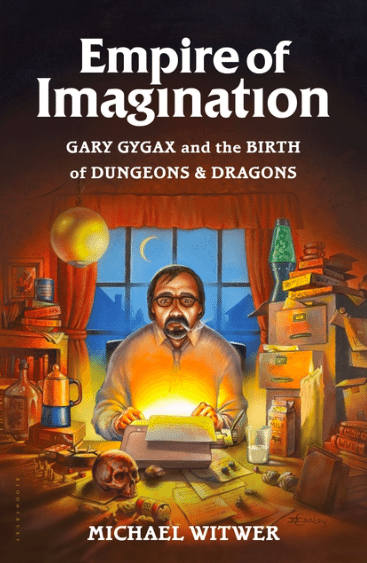On my gaming shelf are a number of books related to the history of role playing games, especially Dungeons & Dragons. I enjoy playing D&D, but I’ve also had a strong interest in the history of gaming in general, especially RPGs. And one of the key figures in the world of RPGs, one who is most often credited for so much of what gamers enjoy these days, is Ernest Gary Gygax. He preferred Gary.
Books such as Jon Peterson’s Playing at the World and the recent four-part book series Dungeons & Designers by by Shannon Appelcline fill in a lot of the details about Gary Gygax and how he, along with Dave Arneson, helped develop the Dungeons & Dragons game that so many of us enjoy today. There’s so much information out there on the history of D&D and how it came to be, but up to now there really hasn’t been much in the way of a biography of Gary Gygax. Some of Gary’s personal history can be found in bits and pieces, scattered here and there in interviews and so many of the articles he wrote in The Strategic Review and Dragon magazine, but there really is so much about Gary Gygax that simply isn’t known except by family and friends and acquaintances who were there in the early days. And author Michael Witwer is trying to change that.
Witwer has just released Empire of Imagination: Gary Gygax and the Birth of Dungeons & Dragons, and it successfully tackles the monumental job of following Gary from birth (July 27, 1938) to his taken-from-us-too-soon death (March 4, 2008) and beyond, examining his influence on geek culture and even non-geek culture.
The book works in two ways — throughout the telling of Gary’s story, Witwer uses personal accounts (from numerous interviews) along with previously documented facts that are collected in one seriously great Bibliography at the end of the book. These details are referenced in the Notes section at the back of the book, providing some certainty to facts, dates, and other important information. Witwer also uses a more personal narrative style of writing, getting readers into Gary’s head by extrapolating details from interviews and other sources and fleshing out events in Gary’s life. An example of this is when Witwer follows Gary out the doors of TSR’s headquarters after he has been removed from his role of president and CEO — Gary walks a small tour of the city of Lake Geneva and visits various sites of importance during his life and career, pondering the people he has met over the years and the activities he has participated in. We don’t really know what was going on in Gary’s mind during those hours after his dismissal, but based on witnesses and family recollections, Witwer attempts (successfully in my opinion) to take what could be simply dry factual observations and spin them into an engaging story.
This mix of facts and narrative begins with Gary’s childhood in Chicago and follows his family’s move back to his mother’s home, Lake Geneva. Chapters show how Gary’s love us chess developed and an adventurous streak that surprised me. I had no idea that Gary was a greaser! White tee shirt, cigarettes, and sneaking a car out of a garage to go cruising with his best friend, Don Kaye. I think I knew that Gary was a high school dropout, but I absolutely did not know he had a small stint in the Marine Corp. These and many more details of Gary’s childhood and high school years makes for very interesting reading!
The book later moves into well known territory — Gary’s involvement with war games and the eventual development of Chainmail and then on to D&D. What I most enjoyed about the book, however, were the personal details that only family and friends could provide — Gary’s enjoyment of fishing, his early storytelling and adventuring with his children, his constant fight with the balance between family and work. And, of course, the latter half of the book goes into the many troubles that TSR faced and the near-constant threats to the company’s success, including the latter years when Gary’s creative controls were being tested by new faces and new challenges from inside TSR and out. Additional chapters follow Gary’s ousting and his attempt at starting over with a new game company, his final years, and his legacy.
Closing out the book are a number of appendices. Appendix A is a timeline of Gary’s life, but it’s Appendix B which is most impressive. I don’t think I’ve ever seen a complete listing of Gary’s life’s work, but here it is on pages 254-264 — ten pages of nothing but games, articles, books, and more. I can’t imagine there could ever be any doubt about Gary Gygax’s critical role in the gaming industry, but if there was… this list would destroy it.
I don’t know how Gary would react to a biography, but I believe Witwer has done right by the man. History is history, and there’s no changing what has been done or said… and certainly facts can be contested. But ultimately the gaming world is better off because we had Gary Gygax. And now we have his story.





